The Chat GPT prompt to Uncoddle the American Mind works by clearing away cognitive distortions and offering possible reframes and solutions based on a growth mindset and wellbeing. Chat GPT is well versed in the Carol Dweck growth mindset so this makes for some easy lifting.
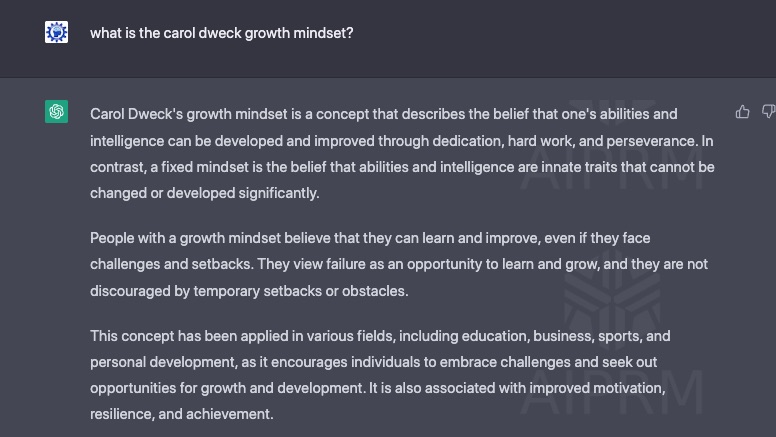
Why Uncoddling?
It's based on the best selling book 'The Coddling of the American Mind' by Greg Lukianoff (lawyer) and Jonathan Haidt (professor/social psychologist). Their book is a New York Times best seller that shows how schools are making kids become weak-minded.
Before they wrote the Coddling, Greg was experiencing depression which eventually led him to discover the benefits of cognitive-behavioral therapy. Once he got better, he noticed that what he learned from CBT was the opposite mindset universities were promoting.
Prior to 2013-2014, the worst constituency for free speech on campus was the administrators, while students were the most reliable fans of free speech.
However, around 2013-2014, students began demanding trigger warnings, micro-aggression policies, and dis-invitations for speakers from both sides of the political spectrum.
Lukianoff and Haidt argue that these demands are based on cognitive distortions that are commonly found in people with anxiety and depression.
The authors call for a return to intellectual humility, viewpoint diversity, and open inquiry on college campuses.
They also propose several recommendations, such as reforming K-12 education, promoting mental health, and creating a culture of free speech and open debate.
Co-author of the 'Coddling of the American Mind', Greg Lukianoff was experiencing anxiety depression and so what worked for him was to challenge the negative self-talk with CBT.
Here is a quote from a clip of when he and co-author Jonathan Haidt were being interviewed by cognitive psychologist Dr. Jordan Peterson.
'If you just learn what these distortions are and practice everyday to talk back to the more anxious or depressed voices in your head, it's an incredibly effective treatment for depression anxiety and it absolutely changed my life'. - Greg Lukianoff
One way to possibly help make this better with A.I. is by combining Chat GPT with some pre-programmed prompts that find cognitive distortions in your entries and then generate responses to alleviate the negative self-talk with beneficial reframes. And while we're, have Chat GPT also offer ideas for a growth mindset.
Here is how this is possible.
This application works on an idea that this book is based on, which is to find cognitive distortions and consider ways of thinking without the distortions.
The job, the function of the A.I. is to find the cognitive distortions in the users input and challenge the negative self-talk with replies using a more positive perspective in under 2000 words. Sounds simple but Chat GPT would reply with apologies and a numbered list of the distortions in a persons text.
So an adjustment was made to soften the responses and make it more personal.
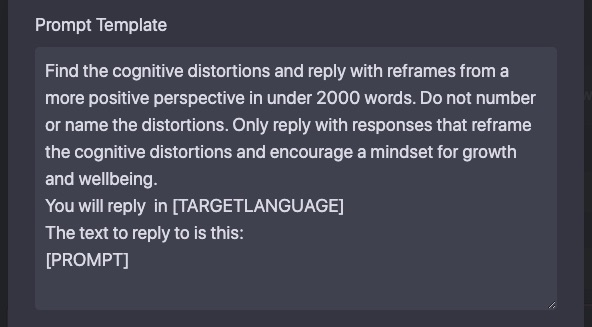
The instructions in the prompt are: "Do not number or name the distortions. Only reply with responses that reframe the cognitive distortions and encourage a mindset for growth and wellbeing."
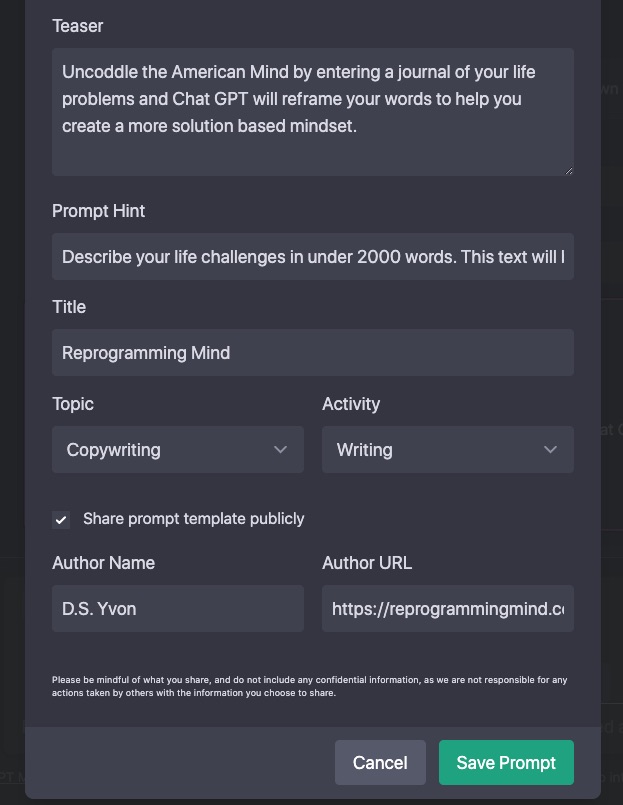
And now the outputs are a bit nicer.
Here is the link to try it out:
https://app.aiprm.com/prompts/1802346395123056640
The link goes to a subsection of Chat GPT called AIPRM which is where people can have access to thousands of pre-made prompts to help users save time.
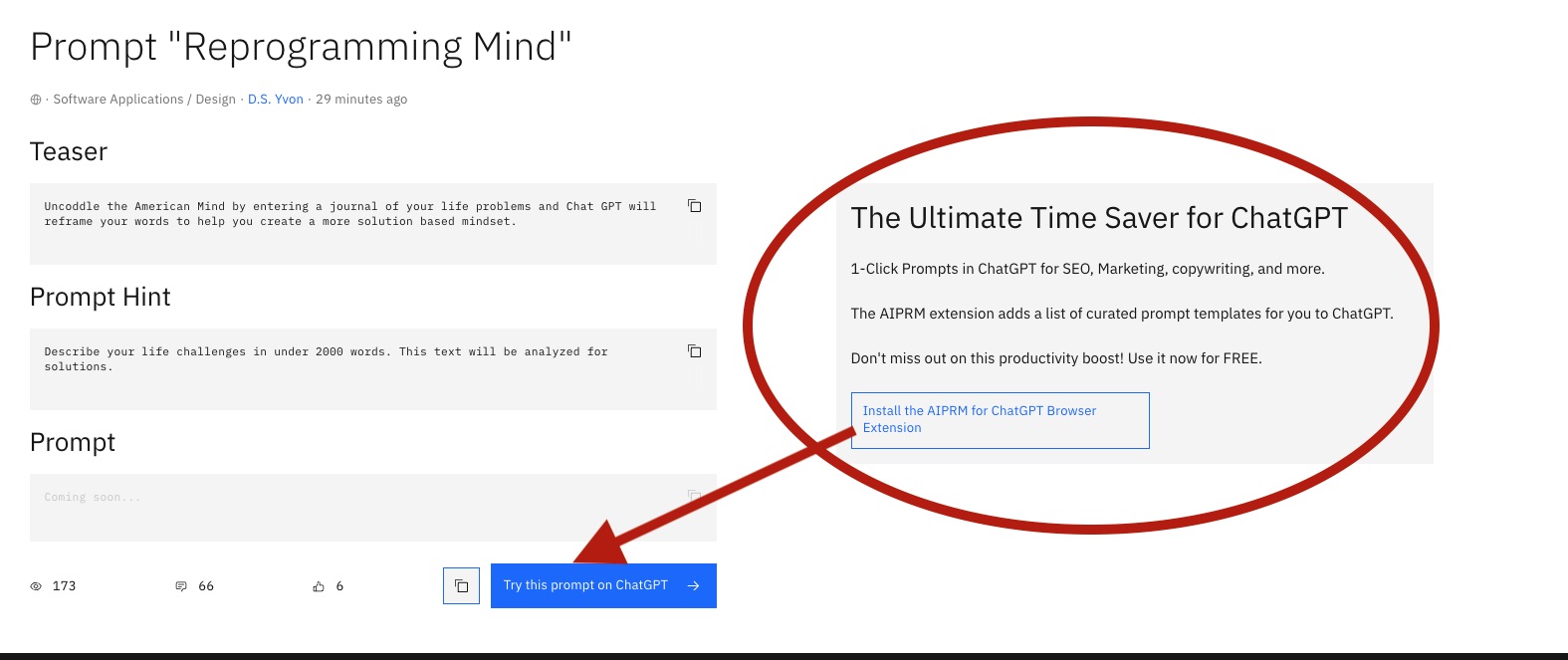
The access is free (for now) and once you make a prompt it works right away. After that there is a screening process to have it approved.
After that you get a better looking link like this https://app.aiprm.com/prompts/1802346395123056640/reprogramming-mind
If you've got stinkin' thinking and are finding yourself perseverating in negative self-talk that is contributing to depression anxiety, try using this AI prompt to help you shift your thinking for good.
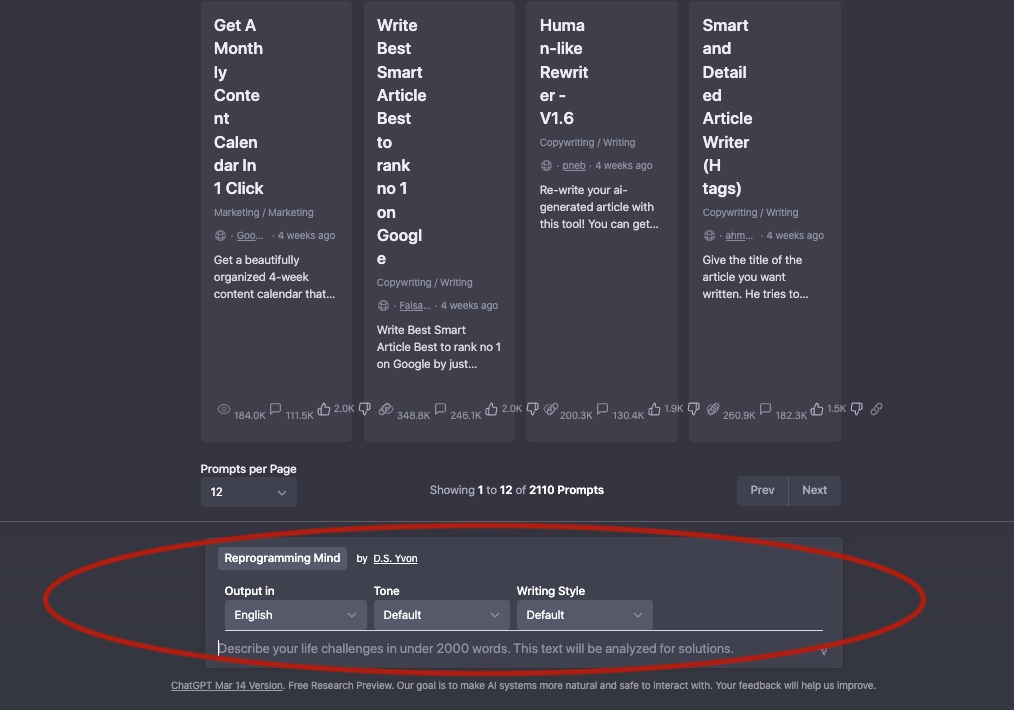
By typing in the thoughts that are making you anxious, the software will look for ways where your languaging might be exhibiting some distortions which can be causing unnecessary anxiety. It then begins to offer some ways to look at it that are more truthful and focused on a growth mindset.
If instead you're looking for online therapy and finding the right cognitive behavior therapist visit https://reprogrammingmind.com/therapy
Here are some cognitive distortions that Chat GPT lists:
- All or Nothing Thinking: seeing things in black and white terms, with no room for middle ground.
- Overgeneralization: making sweeping generalizations based on a single event or experience.
- Mental Filter: focusing exclusively on negative aspects of a situation while ignoring the positive.
- Disqualifying the Positive: dismissing positive experiences or accomplishments as irrelevant or inconsequential.
- Jumping to Conclusions: assuming you know what others are thinking or feeling without evidence.
- Mind Reading: believing that you know what others are thinking or feeling, without asking them.
- Fortune Telling: predicting negative outcomes or catastrophizing, even when there is no evidence to support it.
- Magnification or Minimization: exaggerating or minimizing the importance of events or experiences.
- Emotional Reasoning: believing that feelings are facts, and acting as if they are true without evidence.
- Should Statements: using should, must, or ought statements to impose rigid rules on oneself or others.
- Labeling: using negative labels or terms to describe oneself or others, rather than focusing on behaviors or actions.
- Personalization: assuming that events or experiences are directed specifically at oneself, even when there is no evidence to support it.
- Control Fallacies: believing that one has either total control or no control over situations or outcomes.
- Fallacy of Fairness: believing that life should be fair, and that unfairness or injustice is intolerable.
- Blaming: assigning blame or responsibility for negative events or outcomes, rather than taking a more balanced perspective.
And if you'd like a cheat sheet PDF of these cognitive distortions and a quick way to access this Chat GPT prompt, here you go:15 Cognitive Distortions
